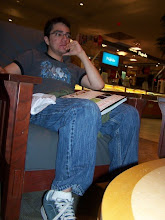
"When a simile or a metaphor doesn't work, the results are sometimes funny and sometimes embarrassing. Recently I read this sentence in a forthcoming novel I prefer not to name: 'He sat stolidly beside the corpse, waiting for the medical examiner as patiently as a man waiting for a turkey sandwich.' If there is a clarifying connection here, I wasn't able to make it. I consequently closed the book without reading further. If a writer knows what he or she is doing, I'll go along for the ride. If he or she doesn't...well, I'm in my fifties now, and there are a lot of books out there. I don't have time to waste with the poorly written ones."
Stephen King's On Writing is just as the cover states: "A memoir of the craft." I became a fan of King's writing in college, when I read a paperback copy of Carrie, which to this day is still my favorite of his books. On Writing is a tip book for emerging writers. King gives insight into the writing world by giving insight into his writing world. But, how else could anyone talk about writing?
King talks of writing as an art and as a job, a 9-5er complete with a toolbox full of all the necessary style instruments. He begins the book with a 98 page bio, where he shows us how writing has woven itself into his life so completely that without it he could not be whole. The final section of the book, detailing his accident in 1999 when he was struck by a careless driver and nearly killed, reiterates this idea of life and writing tied together.
King describes writing as telepathy, magic, but most memorably to me as digging for a fossil. There's something already there, and we have to use the right tools to uncover it. A fossil indicates a suggestion of another world, a suggestion of story. I agree with King that writing is an act of discovering something already there, though I would argue on the detail of whether one is discovering a fossil or something more whole as in a woolly mammoth frozen in an ice block.
On Writing is touching, very funny, and very informative. If you're super stuffy, and refuse to acknowledge that King is truly a great writer, then you might see it as trash. But the truth of the matter is that no matter his subject matter, King is a writer. To quote Roger Ebert: "A lot of people were outraged that he (King) was honored at the National Book Awards, as if a popular writer could not be taken seriously. But after finding that his book On Writing had more useful and observant things to say about the craft than any book since Strunk and White's The Elements of Style, I have gotten over my own snobbery." Author Cynthia Ozick said of King: "It dawned on me as I listened to him that, never mind all the best sellers and all the stereotypes - this man is a genuine, true-born writer, and that was a revelation." Who can argue with a man when his advice to writers is to read a lot and write a lot?
On that same note, I recommend this book to anyone who loves to write, or to anyone who loves to read. Finally, to give you an idea of the tone of On Writing, I leave you with this clip of Stephen King giving advice to beginning writers at Yale.




